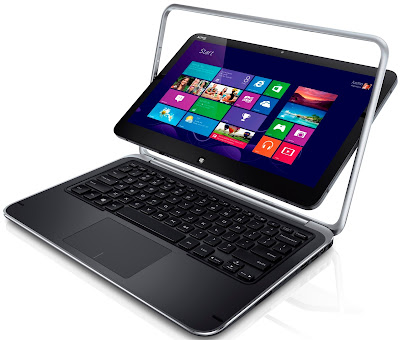Why Ultrabook Convertibles Are Here to Stay
In the last few years, the PC industry
has undergone some large changes, kicking off a wave of innovation and
developments. A lot of these changes are often linked to the
introduction of tablets to the market, which has made mobility, touch
screen interfaces, and convenient apps something of a necessity.
However, the proliferation of tablets has not yet answered the need for
complete productivity, because they have yet to offer all the same
functionality as a traditional laptop or desktop computer.
A Quick History
When Intel first announced the ultrabook category of laptop back
in 2011, it garnered some attention at first for the sleek form
factors, extended battery life, Rapid Start features, and more. The
design goal was simple: it was to combine the convenience and mobility
of a tablet with the features, functionality, and keyboard. An ultrabook
could be both a PC and a tablet and provide the best of both worlds.
However, these models didn’t quite reach the levels of success the manufacturer wanted.
According to the research firm IDC, only about 500,000 ultrabooks were
sold in the first half of 2012; not nearly enough to make the name they
were destined to own. It was going to need something else to boost its
popularity.
When Windows 8 was launched,
things began to change for the ultrabook. The new operating system was
designed for a touch screen interface, which bridged the gap between a
small laptop focused on mobility and a powerful computer that provides
the necessary functionality. It was a start, but there was another
development that would really push the popularity of the ultrabook and
help it get a larger share of the market.
Convertible Designs May Push Demand for Ultrabooks
While touch screen interfaces and solid, functional keyboards
are both great, the ultrabook wasn’t quite finding a place in the
market. Perhaps this was simply because with the increasing popularity
of the tablet, many users didn’t see the need to upgrade a laptop that
was still “good enough” if they could simply complement their work with a
new tablet. This is why convertible ultrabooks have started to make
waves.
These computers allow users to flip, swivel, or otherwise employ the
screen of an ultrabook as a traditional tablet, effectively bringing the
two models closer together. This provides the convenience of the
smaller devices while still offering all the productivity options that people still need; one step closer to being “good enough” for one to make a switch.
Intel is still behind the ultrabook category, and at a recent conference
announced a low-power 7-watt version of its Ivy Bridget processors for
ultrabooks. This new chip
will give manufacturers even more flexibility to create thinner and
lighter convertibles that still have a usable keyboard and touch screen
interface. Intel is also introducing its 4th gen core processors (code
named Haswell) this year, which can provide up to 13 hours of battery
life and a lot more power than the average tablet processor. These
aspects were key in gaining the attention that the ultrabook computers
needed.
Differences that Matter
Tablets have, without a doubt, been extremely popular over
the last few years. While some have said this spells the death of the
traditional computer market, new developments like the hybrid or
convertible models seem like they’re here to stay.
Consider the differences.
A user could, for example, purchase a 13" convertible ultrabook that
has a top-of-the-line display, somewhere between 128GB to 256GB SSD, a
powerful processor and 4 to 8GB or RAM. These specs are, of course, on
top of the convenience, portability, and tablet-like interface. Compare
that to one of the top 10" tablets on the market, with maybe 64GB of
storage, a gig of RAM, and processors that don’t exactly push any
boundaries. This combination of mobility and power is what will keep
these ultrabooks around for a long time. For more information on these
ultrabooks visit the
What are your thoughts on ultrabook convertibles? Please give us your input and converse below.
Author Bio
Author Bio
Jared Jacobs is very passionate about technology. While working for Dell he has gained valuable knowledge about the enterprise solutions and consumer marketplace. After work Jared enjoys working on his home and watching his favorite sports teams.



No comments:
Post a Comment